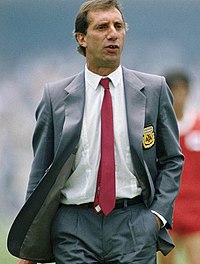Carlos Bilardo

Bilardo as Argentina's manager
in the 1986 World Cup. |
|||
| Personal information | |||
|---|---|---|---|
| Full name | Carlos Salvador Bilardo | ||
| Date of birth | 16 March 1939 | ||
| Place of birth | Buenos Aires, Argentina | ||
| Playing position | Midfielder | ||
| Youth career | |||
| San Lorenzo de Almagro | |||
| Senior career* | |||
| Years | Team | Apps | (Gls) |
| 1958–1960 | San Lorenzo | 174 | (12) |
| 1961–1965 | Deportivo Español | 111 | (39) |
| 1965–1970 | Estudiantes | 175 | (11) |
| Total | 460 | (62) | |
| National team | |||
| 1959 | Argentina youth | ||
| Teams managed | |||
| 1971 | Estudiantes | ||
| 1973–1976 | Estudiantes | ||
| 1976–1978 | Deportivo Cali | ||
| 1979 | San Lorenzo | ||
| 1979–1981 | Colombia | ||
| 1982–1983 | Estudiantes | ||
| 1983–1990 | Argentina | ||
| 1992–1993 | Sevilla FC | ||
| 1996 | Boca Juniors | ||
| 1998 | Guatemala | ||
| 1999–2000 | Libya | ||
| 2003–2004 | Estudiantes | ||
| * Senior club appearances and goals counted for the domestic league only. |
|||
Carlos Salvador Bilardo, MD (born 16 March 1939 in Buenos Aires) is an Argentine former football player and manager, who is currently the General Manager of the Argentina national football team.
Bilardo achieved worldwide renown as a player with Estudiantes de La Plata in the 1960s, and as the manager of the Argentina side that won the 1986 FIFA World Cup and came close to retaining the title in 1990, where they reached the final. As manager of Argentina, he was renowned for successfully employing the 3–5–2 formation at the highest level; this formation has been in use for decades, but has never achieved mainstream status.
He is known by fans and the media as el narigón (big nose).
Bilardo was born in the Buenos Aires La Paternal neighbourhood to Sicilian immigrants from Mazzarino. He was drawn to football from his childhood, but did not neglect study or work. On school vacations, he would get up before dawn to haul produce to the Abasto market in Buenos Aires.
Bilardo was a promising prospect in the youth divisions of major Buenos Aires club San Lorenzo de Almagro, and he was drafted to the junior Argentina national football team that obtained the 1959 Pan-American title and took part in the 1960 Summer Olympic Games in Rome.
In 1961, Bilardo was transferred to second-division side Deportivo Español, where he became the team's top scorer, but he slowly gravitated to the position of defensive midfielder. In parallel, he continued his studies in the Faculty of Medicine of the University of Buenos Aires.
...
Wikipedia
